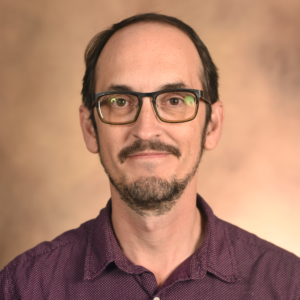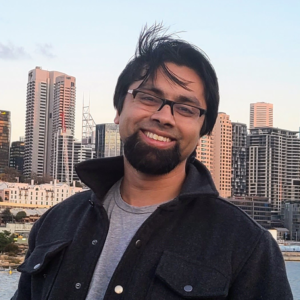The Institute for Sustainability, Energy, and Environment (iSEE) has selected four external scholars to be part of the Stuart L. and Nancy J. Levenick Resident Scholar in Sustainability Leadership program for the 2024-25 academic year at the University of Illinois Urbana-Champaign.
Funded by a generous endowment from Illinois Alumnus Stuart L. Levenick and his wife Nancy J. Levenick, the resident scholar program brings experts from other universities, the private sector, and nonprofit organizations to share fresh perspectives, stimulate interdisciplinary interactions, and connect with the University of Illinois community.
This cohort of resident scholars hails from across the country — and beyond. They will pursue their scholarship while interacting with students and faculty across campus to promote multi-disciplinary research, education, and outreach.
The 2024-25 awardees and the projects they will undertake:

Matt Scholz
Matt Scholz is a Research Professor in the Global Institute of Sustainability & Innovation at Arizona State University and is the senior project manager for the Sustainable Phosphorus Alliance (SPA).
“Dr. Scholz has much to offer our campus on discussions on phosphorus sustainability research – a topic that is of great importance to the Midwest region of the U.S., given our phosphorus loss challenges,” said Andrew Margenot, Associate Professor of Crop Sciences at the University of Illinois.
Scholz began his environmental career as an undergraduate at the University of Illinois, where he co-organized the national conference for the Student Environmental Action Coalition in 1989.
“It’s been a nostalgic and productive return to my alma mater, and I’ve had the opportunity to share my sustainability work with Illinois students and faculty and connect with existing and new colleagues on several projects,” Scholz said. “Both my organization (SPA) and the NSF Science and Technology Center (STEPS) that I co-manage are eager to develop and extend collaborations with the University of Illinois to tap its expertise in areas of agricultural policy development, watershed management (especially along the Mississippi), and nutrient recycling. It’s been particularly valuable to access external stakeholder community relationships that Illinois researchers have built with national policy makers and regional watershed groups, which allows us to leverage these networks to vet and disseminate our work.”
Scholz gave a public seminar on Sept 13th in Turner Hall, titled “Phosphorous sustainability: A systems perspective.”
 Tirthankar “TC” Chakraborty
Tirthankar “TC” Chakraborty
Tirthankar “TC” Chakraborty is an Earth Scientist at Pacific Northwest National Laboratory (PNNL). He conducts research on urban climate and the impact of climate change on urban environments.
“TC is an extremely talented scientist who is a leader in understanding and modeling atmosphere-biosphere interaction in urban areas,” said Michael Ward, the Stuart L. and Nancy J. Levenick Chair of Sustainability, Professor, Department of Natural Resources and Environmental Sciences. “As our climate continues to change, urban areas are likely to be heavily impacted. TC’s talents and interests will be a great asset to the campus, and we are excited for his 3-month visit.”
“I am very excited about coming to the University of Illinois and working with a group of world-class researchers, particularly on issues related to urban environmental impacts and equitable urban development,” Chakraborty said. “Universities are centers of open minds, fresh perspectives, and unending enthusiasm; and I hope to make my time there fruitful and productive, with a goal of broadening my research and its impacts by incorporating new viewpoints, ideas, and methodological tools.”
Of note, he will be working on improving urban representation in models with long-term collaborator Lei Zhao, who is in the Civil and Environmental Engineering Department. He also hopes to work with Ashish Sharma, who is associated with the Department of Climate, Meteorology & Atmospheric Sciences, and plans to contribute to and learn from the work they are doing for a U.S. Department of Energy Urban Integrated Field Laboratory project over Chicago to better understand how urban climate change stresses people, infrastructure, and the environment.
“My research interests have always been diverse and interdisciplinary,” Chakraborty said. “And I am looking forward to bringing my unique perspective and expertise to the University of Illinois to form and strengthen both individual and institutional collaborations.”
Chakraborty gave a public seminar on Sept 10th in the Natural History Building, titled “Capturing urban climate signals and their spatial variability in process-based models.”
 Sangeeta Bansal
Sangeeta Bansal
Sangeeta Bansal is a Professor of Economics at Jawaharlal Nehru University, India. Her research will focus on corporate socially responsible efforts in India towards meeting sustainable development goals for the country.
“We are excited to welcome Professor Sangeeta Bansal from the Center for International Trade and Development, Jawaharlal Nehru University, Delhi, to our campus,” said Madhu Khanna, iSEE’s Alvin H. Baum Family Chair and Director. “She is a leading energy and environmental economist in India and also co-editor of Agricultural Economics, the flagship journal of the International Association of Agricultural Economics. Her visit represents a fantastic opportunity for closer collaborations among social and behavioral scientists and environmental scientists on campus and for expanding collaborations with research institutions in India to address global environmental challenges.”
Her research interests are wide ranging and at the intersection of environment, economic development and health economics. She studies the effects of obesity on life expectancy, energy and environmental regulations, and the motivations and effectiveness of corporate social responsibility efforts in India.
“The wealth of resources across multiple disciplines at the University of Illinois campus will provide me collaborative opportunities with experts in climate and atmospheric sciences, engineering, agronomy, ecology, food systems, nutrition, and public health, and to learn perspectives and methods from other disciplines,” Bansal said. “This integrated approach to addressing sustainability issues will greatly enhance my research capability.
“I am particularly excited to visit the Institute for Sustainability, Energy, and Environment. The prospect of visiting actual farms to observe sustainable practices in the fields is an exciting one. I also look forward to engaging with students from various parts of the world and experiencing the rich cultural diversity that the campus offers. The Krannert Art Museum and performing arts scene at the campus also attract me, which I am keen to explore.”
 Xinfang Wang
Xinfang Wang
Xinfang Wang is an Associate Professor and Group Leader of Resilient Systems for Energy and Cooling in Birmingham Energy Institute at the University of Birmingham, United Kingdom.
She is the Principal Investigator for a large 4-year U.K. Research and Innovation project “Zero Emission Cold-Chain” (ZECC) – Building the Road to Sustainable Cold-Chain Systems for Food Resilience. Wang is also the U.K. Energy Research Centre’s (UKERC) EDI champion and sits on the UKERC Research Committee, advising on its strategy and priorities of flexible fund.
Wang has published in top scientific journals in the fields of energy and cooling. She has a strong background in whole systems research for Net Zero energy and the cold chain, especially from behavior, public perception, economic, business model, innovation system and policy perspectives. Her research covers both developed and developing countries such as Rwanda, Kenya, India, Bangladesh, Mexico, Nepal and China.
She has been PI and co-PI on a list of projects with a total value of over £20 million that are funded by EU H2020, U.K. Research and Innovation, Newton Fund, Defra, DESNZ (previously BEIS), World Bank, Wellcome Trust, Climate Change Committee, and UKERC.
Wang previously worked with iSEE on a Birmingham-Illinois Partnership for Discovery, Engagement, and Education (BRIDGE) funded project to compare the campus decarbonization activities and strategies between the University of Illinois and the University of Birmingham.
“The Levenick Resident Scholarship will allow me to spend a longer time at the University of Illinois to collaborate on research activities in cooling, transport, energy, and emissions,” Wang said. “This opportunity will significantly contribute to my long-term goal of being an academic leader in energy and decarbonisation with resilient energy and transport systems, as well as reducing food waste and food loss with robust cold chains. I hope to work with Illinois colleagues to develop large joint grant applications and co-authored papers, and to deliver further impacts of the existing projects I lead on resilient and net-zero emission cold chains.”
Since 2023, Wang has been discussing collaboration with with Eleftheria Kontou, Assistant Professor of Civil and Environmental Engineering; and Megan Konar, Associate Professor of Civil and Environmental Engineering at Illinois. Their shared interests in the area of transport decarbonization, especially refrigerated supply chains, open up many opportunities to work together. While at the University of Illinois, Wang plans to continue her work with them and explore other possible collaborations.
“I am very interested in collaborating with Xinfang in the field of sustainable transport and logistics as well as decarbonization food supply chains,” Kontou said. “She has also exhibited interest in engaging in our Global Center CLEETS (Clean Energy and Equitable Transportation Solutions).”
— Article by iSEE Communications Specialist April Wendling